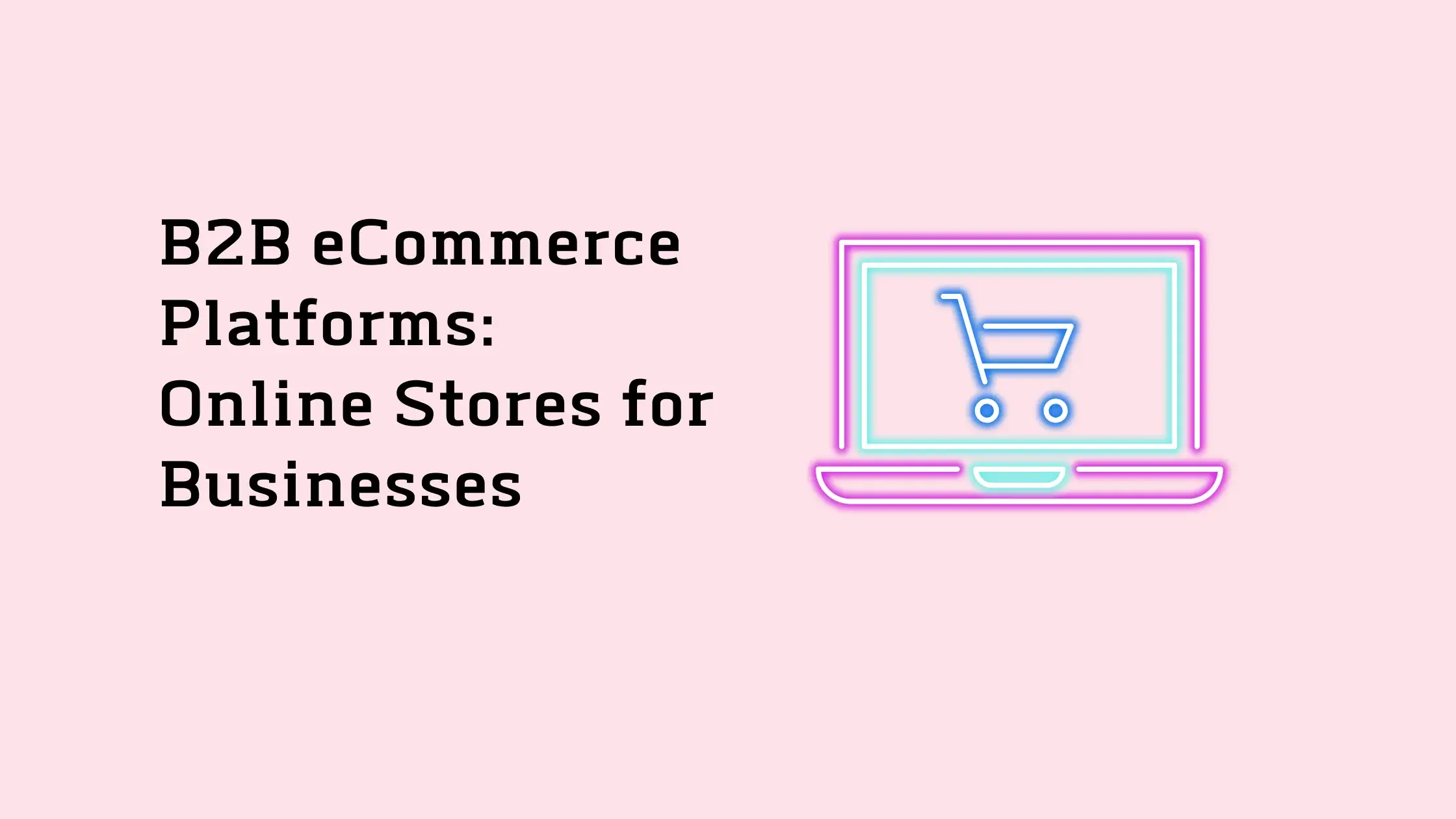This guide will help you whether you’re new to B2B eCommerce and want to make the most of your B2B website. This article will cover all the basics of B2B eCommerce and the top eCommerce platforms for B2B companies in 2022. Consider SEO Features, Wholesale Platform. Wholesale Channel. Custom Pricing and Time To Market in B2B eCommerce platforms. Also, Payment Methods, B2B Merchants. Complete Control, Business Owners are important in B2B eCommerce platforms.
B2B eCommerce: What’s it all about and some examples:
What is B2B eCommerce?
B2B eCommerce stands for Business to Business eCommerce.
B2C eCommerce stands for Business-to-Customer eCommerce.
B2B eCommerce refers to strategies and practices facilitating B2B selling in digital spaces.
B2-B ecommerce platforms may have many similarities to B2C media. However, it is more complex and requires specific features. Why? This is because the B2C relationship has a simpler structure than B2B. B2C is a one-to-one relationship. Therefore, B2-B businesses must treat each customer differently. B2B buyers also require different eCommerce features, such as bulk orders, volume discounts, etc. These features will be discussed later in this article.

Below is a quick comparison of various eCommerce platforms for B2-B businesses. You should note that not all platforms can be classified as one type. Some platforms can be combined. Magento, for example, is OpenSource and PaaS. It is important to put in extra effort when developing an app CS-Cart, on the other hand, are OpenSource and SaaS. Consider the below-mentioned factors before making a decision, such as Hyper-Local Marketplace Software, Software Solutions, Security Parameters, Strong Security, Outstanding Security Services, Favorite Neighborhood Stores, Favorite Stores, Grants Store Owners, and International Market. Market Marketplace Solution and Market Specialists.
Enable Multi-Currency Payment Options, Regional Payment Gateways, Bulk Order Purchases, Purchase Quantity Restriction, and Unlimited Purchase Possibilities.
Motivate Business Purchases for your BigCommerce Enterprise with the following:
House Development Team
1. Business Technology
2. Delivery Processes
3. Online Merchants
4. Migration Tool
Do you believe in Customization Plans, Outstanding B2B Functionalities, Decrease Costs, an Array Of Opportunities, Merchandising Promotions, Seasonal Promotions, and Qualified Review plus Cart Review?
Follow best practices regarding the Level Of Control
Enable your Business From Idea and Idea To Reality.
This article will include the steps needed to create and develop an ecommerce mobile app.
The 5 Best eCommerce Platforms for B2B Businesses in 2023
1. Magento Commerce
Magento was released for the first time in 2008. Adobe purchased it 10 years later for $1.68 billion. It was considered a leader in B2B Commerce platforms, the highest-ranking tier according to the Forrester Wave 2020. It is reliable enough that large companies like ASUS, HP, and Samsung trust Magento for their eCommerce websites. You can increase trust and user retention by enabling users to complete the shipping process once they have logged on to your site.
As a result, the traditional B2B sales model has fallen from 61% to .29%. This opens the door for digital sales.
- It is better than other options.
- A lot of B2B functionality: Buyers’ account, ERP integration, customer segmentation, personalization, and specific customer segmentation
- Magento offers customized solutions to hybrid stores.
- Mobile-friendly
- Magento Commerce Cloud Hosting offers enhanced security. Websites have access to private servers and various protections, including DDoS, Firewall, CDN, and DDoS.
- Fully customizable: For scalability, unique functions, and flexibility
- SEO-friendly: Magento is a top-ranked eCommerce platform in terms of SEO.
- Many extensions can be customized further: over 1500 Magento Commerce extensions are available on Magento Marketplace.
Cons:
A PaaS platform has its drawbacks: It is expensive and takes too much time.
Pricing:
The company’s revenues could be anywhere from $22,000/per year to $125,000/per year.
2. Shopify Plus
Shopify is the top eCommerce platform, with more than 23% market share. Additionally, our research shows that Shopify is the 5th most-rated eCommerce platform in G2 and the 2nd best for B2B.
Shopify Plus, Shopify’s upgraded plan for wholesale and B2B businesses, has already reached 10,000+ users by 2021. Some of the most prominent names include Heinz, Staples, and Gymshark.
It is better than other options.
- Shopify is fast to develop: A basic online store can be created in as little as two weeks.
- Shopify’s cloud hosting gives it a great user experience and speeds up its website. Shopify also offers a wide range of paid and free themes that can be customized to your site’s look and feel.
- There are many extensions available for customization. Shopify Plus has over 6,000 Shopify Apps and 60+ Shopify Certified Apps.
- It’s easy to set up and use.
- B2B functionality that is ready to go: Inventory management, customized products, pricing, and payment, setting minimum and maximum pricing thresholds, custom pages, a self-service portal, and omnichannel support. UX UI design offers a unique opportunity to make your ecommerce mobile app stand out.
Cons:
- Shopify does not support multi-store.
- Shopify will only allow one storefront per account.
- This is not as scalable and flexible as other headless commerce platforms.
- Shopify Plus offers limited customization when compared to OpenSource platforms. Shopify Plus is a significant upgrade from Shopify’s original Shopify in terms of customization. It’s also not bad overall. However, the platform has limitations in backend customization compared to other platforms for enterprise-level services.
- Merchants cannot have more than 100 product variations
- Prices for Shopify vary depending on the needs of your business.
3. TrueCommerce
TrueCommerce is a pioneer in electronic data interchange (EDI), allowing businesses to electronically exchange documents and data such as purchase orders and invoices. Wholesalers can benefit from its B2B platform solution that includes EDI, enabling them to automate their processes and save time.
It is better than other options.
- Amazing B2B features
- Optimizations and Buyers Account
- Pricing based on volume for category products and orders
- Inventory management
- Support Omnichannel: Sales reps can place orders, capture orders at trade shows, and integrate POS.
- Quote Automation
- Integration with other applications
- Empower EDI
- For unique websites, custom web designs
- Easy to use, user-friendly interface
Cons:
- Hidden cost: Some reviews suggest that there might be an additional cost
- The platform requires a learning curve for non-tech-savvy users.
Pricing:
TrueCommerce prices are available upon request
4. SuitCommerce by Oracle NetSuite
Oracle NetSuite eCommerce b2b
NetSuite, a leader in Cloud ERP services, offers a SuiteCommerce solution for B2B eCommerce. SuiteCommerce offers ERP solutions at affordable prices for small- and medium-sized businesses, while many ERP companies target large-scale enterprises. Over 3,000 customers have used the B2B platform to date.
It is better than other options.
- True Omnichannel: Supports all sales channels, from online shops and physical stores to in-house sales, distributors, and manufacturers.
- Smooth and consistent operation: An integrated system of ERP, CRM, and inventory management allows for better stock management, data storage, and customer service.
- Rapid deployment: Your site will be ready in 30 days
- It’s easy to convert quotes into orders and get volume discounts.
Cons:
- Unfriendly for the newbie: It isn’t easy to learn how to use.
- Integration is limited: Finding the right third-party app takes some time, or you will have to create one yourself.
- Large companies are not optimized due to the absence of automation and integration.
Pricing: NetSuite charges a nominal fee upon request. Referentially, NetSuite may be set as low as $40,000 per year.
5. CS-Cart
CS-Cart B2B ecommerce platform
CS-cart was founded in 2005 and has served over 35,000 customers in more than 170 countries. The platform’s B2B features are strong for multi-vendor use. In addition, this company offers a simple solution that allows wholesalers and manufacturers to automate their selling processes and increase sales costs.
It is better than other options.
- Multiple storefronts: Create as many storefronts as you like and manage them all from one dashboard. This factor helps us choose the best mobile app platform and feature set for our target audience.
- Unlimitless integration: Integrate with any third-party ERP, CRM, or accounting software.
- No hassle fee and no additional costs.
- OpenSource is highly customizable.
- A wealth of B2B features are available: personalized price, inventory control for multiple warehouses, customer accounts, etc.
- There are 70+ payment options available to vendors.
Cons:
- Custom development is expensive: Other than the license price, you will need to hire a professional to use the source code fully.
- Themes and add-ons are limited: There are fewer themes than on other eCommerce platforms like Shopify or Magento.
Pricing:
Standard: $1,450/year
Plus: $3,500/year
Ultimate: $7,500/year
Remember the following as dynamic when designing an ecommerce mobile app such as Commerce Cloud Digital, Commerce Cloud Endless Aisle, Commerce Cloud Order Management, Commerce Cloud Partner Marketplace, Comprehensive Commerce Solution, Salesforce Commerce Cloud B2B, Adobe Commerce Cloud, Business To Business Electronic Commerce
Do you believe, concerning the customer, the following:
1. Customer Insights
2. Collecting Of Customers
3. Customer Data Protection
4. Customer Retention
5. Integrated Customer Experience
6. Personalization With Customer
Consider a product with the following:
1. Wholesale Features
2. Limited Features
3. Progressive Features
4. Internationality Feature
5. Outstanding Features
Do you believe in the Above-Mentioned Top B2B ECommerce Platforms as the Largest Selling Platforms, Multi-Tenant, Cloud-Based Platform, Online Channels, Sales Across Channels, Company Across Channels, Product Content with Wholesale Product Prices?
Do you ensure Customized Product Recommendations and enable Bulk Item Pricing?
Consider SEO Features, Wholesale Platform. Wholesale Channel. Custom Pricing and Time To Market in B2B eCommerce platforms. Also, Digital Channels, Built-in-Features, Payment Methods, and B2B Merchants. Complete Control, Business Owners are important in B2B eCommerce platforms.
Conclusion
B2B eCommerce platforms have bright prospects. The limitations of digitalization will no longer limit B2B eCommerce. We know this is something you are aware of because you are reading this article. We hope you can accelerate digitalization and beat the slower-moving competition.

Dr.Supreena has published two international books in finance with the able guidance of her guide and department at Ethiraj College of Women, University of Madras during her PhD in Economics and Finance. She is the Recipient of Dr Vedagiri Shanmugasundaram (An Oxford Scholar) Award for Outstanding and Successful PhD Candidate from Ethiraj College for Women concerning research record and academic distinction. She is experienced in the domain of finance, digital marketing and information technology writing on Artificial Intelligence, IoT, PaaS and SaaS cloud computing etc. She is NIIT qualified in Advanced Network Computing, Google Certified in digital marketing. Her hobbies to maintain balance and reduce stress are gardening and cooking.


